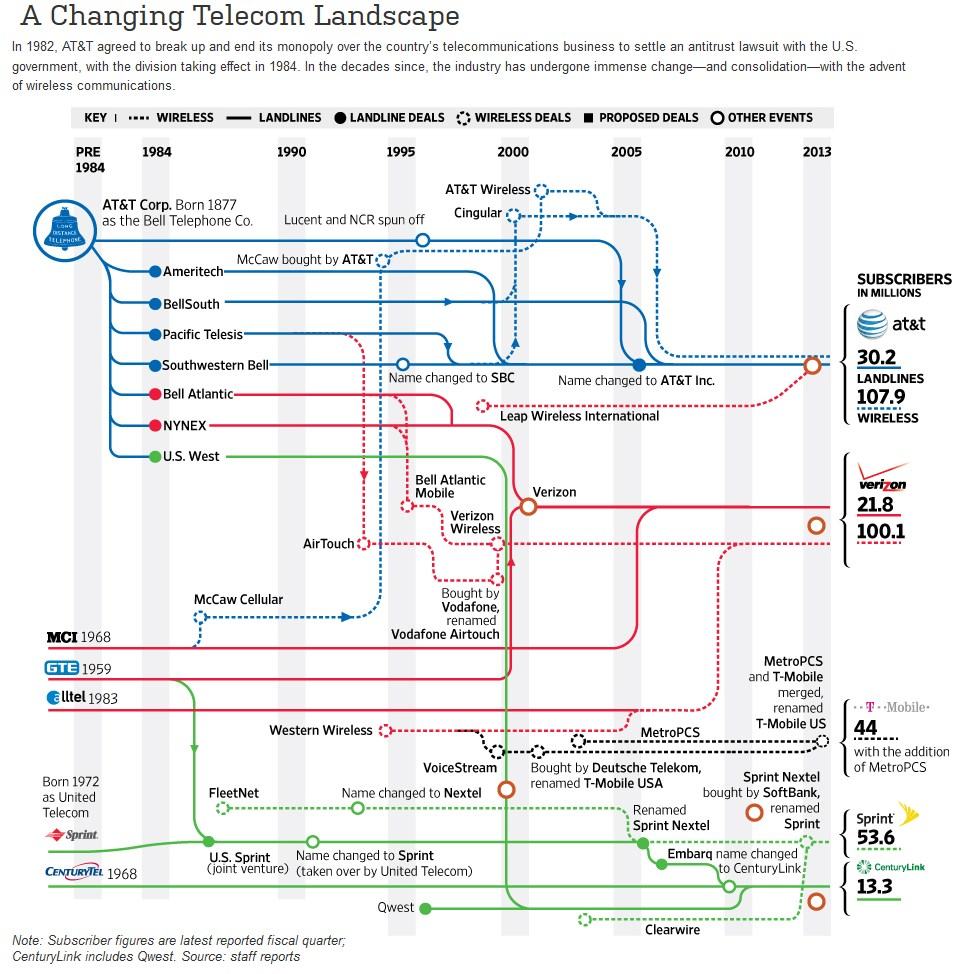 Executives at Canada’s largest telecom companies are sighing relief after Verizon announced it was not interested in competing in Canada.
Executives at Canada’s largest telecom companies are sighing relief after Verizon announced it was not interested in competing in Canada.
“Verizon is not going to Canada,” Lowell McAdam, chief executive officer of New York-based Verizon, said yesterday in a phone interview with Bloomberg News. “It has nothing to do with the Vodafone deal, it has to do with our view of what kind of value we could get for shareholders. If we thought it had great value creation we would do it.”
McAdam added he thought speculation about Verizon’s plans in Canada was “way overblown.”
[flv width=”480″ height=”290″]http://www.phillipdampier.com/video/CBC Big 3 Canada telecom stocks surge as Verizon threat fades 9-3-13.flv[/flv]
The CBC reports three of the largest telecom companies in Canada are seeing their stock prices soar on news Verizon won’t enter Canada. Kevin O’Leary takes a position shared by Bell, Telus and Rogers that no spectrum should be set aside for new competitors. Instead, he seeks a “winner takes all” auction, even if it means dominant incumbent carriers monopolize every available frequency. (3 minutes)

McAdam
Verizon’s possible entry into Canada was among the hottest stories of the summer, even reported on the CBC’s national nightly news. The potential new competition provoked Bell, Rogers, and Telus — three of Canada’s largest phone and cable companies — to join forces in a multimillion dollar lobbying effort to slow Verizon down and make the wireless business in Canada less attractive. The Harper government used news of Verizon’s potential entry to promote its policies favoring competition over regulation.
Verizon Chief Financial Officer Fran Shammo said the company was considering a wireless venture in Canada at a June Wall Street investor conference.
“We’re looking at the opportunity,” Shammo said at the time. “This is just us dipping our toe in the water.”
Verizon took its toe out yesterday, despite the potential profits available in a country criticized for its extremely expensive cell phone service.
“I’m surprised that Verizon isn’t interested in Canada,” tweeted Adam Shore. “There are over 33 million suckers up here that will pay ridiculous cell phone rates.”

Bell joined Telus and Rogers in launching a multi-million dollar lobbying effort to make Verizon’s entry into Canada difficult.
The three companies most Canadians now buy wireless service from denied they wanted to keep Verizon out, arguing they simply wanted a “level playing field.”
Industry Minister James Moore suggested a fourth large player could provoke a price war in a way much smaller wireless providers like Wind Mobile or Mobilicity never could. The government was willing to set aside coveted 700MHz wireless spectrum at a forthcoming auction to help a new entrant — any new entrant — get started.
Verizon’s decision to stay out might have delivered a damaging blow to the Conservative government’s “pro-competition” solution to the problem of high cell phone bills. After the announcement, Moore was left promising only that spectrum auctions would carry on regardless of Verizon’s decision.
For now, the best chance of increased competition comes from Quebecor, which is gradually expanding its wireless network. Spectrum set asides almost guarantee the owner of Quebec’s cable giant Vidéotron will be able to bid for and win significant spectrum at the upcoming auction, some at a discount.
“If Verizon doesn’t show up, they’re actually in a very strong position to buy a block of spectrum that will not be very expensive,” Maher Yaghi, an analyst at Desjardins Securities Inc., told Bloomberg News. “Wireless is currently providing them with a nice growth platform.”
Without a surprise late entrant suddenly announcing interest by the auction filing deadline of Sept. 17, many analysts predict the outcome will likely not deliver Canadians any significant changes in cell phone service and pricing. The government may also be disappointed with the auction proceeds. Canada’s big three will likely avoid overbidding and still end up dividing most of the available airwaves between them. Quebecor may end up with most of the rest at comparatively “fire sale” prices. The Montreal-based company must then decide how much it will spend to expand its home coverage areas outside of Quebec, Toronto, and southeastern Ontario.
[flv width=”640″ height=”372″]http://www.phillipdampier.com/video/BNN Verizon Wont Enter Canada 9-3-13.flv[/flv]
BNN reports Verizon’s decision not to enter Canada leaves the Conservative government without an effective means to moderate cell phone pricing in the country. Mary Anne de Monte-Whelan, president of The Delan Group, observed the government may be forced to take a more regulatory approach to control expensive cell service, possibly starting with roaming rates. (7 minutes)
 If “follow the money” is a maxim in business, then it should come as no surprise Verizon favors the making the bulk of its investments and expansion in its enormously profitable wireless business.
If “follow the money” is a maxim in business, then it should come as no surprise Verizon favors the making the bulk of its investments and expansion in its enormously profitable wireless business.

 Subscribe
Subscribe

 Executives at Canada’s largest telecom companies are sighing relief after Verizon announced it was not interested in competing in Canada.
Executives at Canada’s largest telecom companies are sighing relief after Verizon announced it was not interested in competing in Canada.




